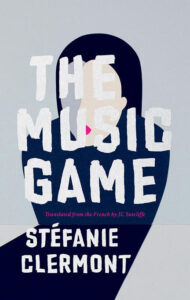March 10, 2022
The Music Game, by Stéfanie Clermont, translated by JC Sutcliffe
‘”Three shadows are bending over each other around a table,” Celine begins… “They are old, young, it doesn’t matter. A hand moves and the number three blurs. Maybe there are actually four of them, or even more. A hand comes out of the shade, rests between the black coats. The glasses on the table are also lanterns. They don’t touch them. They’re too busy with plotting.”‘
I’d held off on picking up Stéfanie Clermont’s award-winning first book, The Music Game, which just came out last month in English translation by JC Sutcliffe, because it’s been a tough time and I’ve been wary of anything too bleak—this is a collection of linked stories loosely structured around a suicide after all. But it turned out to not be a painful read, in spite of a whole lot of pain and longing at its core, because fundamentally, The Music Game is just interesting. Pitched to me as a book for fans of Sally Rooney, or else a modern version of The Big Chill, both of which were enough to pique my interest, and I enjoyed it very much.
This is the story of three friends who, like the book’s author, are Franco-Ontarian, growing up around Ottawa. The collection more cyclical than linear, moving back and forth between their teenage years and then their lives a decade or so on, and encompassing the stories of other friends and roommates and voices, underlining the surprising ways that lives overlap and also that the past is never truly behind us.
Clermont’s characters work dead-end jobs, struggle to complete their theses, argue about politics, look for roommates, get tattoos, experience gender fluidity, escape dangerous relationships, have creepy cousins and stepdads, take to the streets, and rue their parents’ bourgeois values all the while they spend weekends at their country house. They grow up too fast, but can’t seem to move on, all the while trying to plot their way through a culture and even a counterculture that seems to have set them for failure. Staying connected, and falling out of touch, and giving up, and also persisting.
And maybe when I say the book is cyclical, what I really mean it that it’s a web, with strange, uncanny and surprising connections, weird gaps, and a whole lot of questions, and each of these characters (caught in it? spinning it?) read as wondrously alive and real, achingly messy and complicated.






